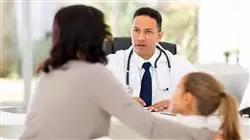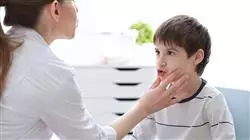University certificate
The world's largest faculty of medicine”
Description
This university program, compatible with your professional responsibilities, will keep you up to date on the latest research in Orofacial and Myofunctional Therapy”

A unique specialization program that will allow you to acquire advanced training in this field"
The specific work done on speech difficulties has always been closely linked to the work done by speech therapy professionals. However, beyond communication problems, the proper exercise of certain facial muscles and orofacial posture has a considerable influence, not only in properly communicating, but also in feeding or eating. Pediatricians, neurologists, ENT specialists, nurses and even dentists are involved in the correct development of patients suffering from brain damage, speech or developmental disorders.
In recent years, Orofacial and Myofunctional Therapy (OMT) has been consolidated, especially thanks to scientific studies that support the use of its techniques to improve patient health in, for example, swallowing problems. These advances facilitate medical professionals to prevent, evaluate, diagnose and intervene in orofacial disorders or dysfunctions. Given its relevance, TECH has designed a program with the most updated knowledge on Speech Neurorehabilitation and Vital Function Analysis, as well as Orofacial and Myofunctional Therapy.
A program that takes a theoretical-practical approach, which will guide physicians through orofacial disorders, intervention in dysphagia of neurological origin in adulthood, feeding/eating in patients with ASD or OMT. All of this is accompanied by multimedia resources based on video summaries, detailed videos or specialized readings that will allow for a much more dynamic and agile way to study the subject in more detail. What is more, the Relearning system used by this academic institution facilitates agile progression throughout the program, reducing the long study hours often required in other methodologies.
Medical professionals are before an excellent opportunity to update their knowledge through an academic option taught in an exclusively online and flexible format. Students will only need an electronic device with an Internet connection to access the syllabus whenever suits them. A professional master’s degree with no required attendance, or fixed scheduled classes, ideal for professionals who wish to balance a university program with their work and personal responsibilities.
Thanks to this professional master’s degree, you will obtain the most recent scientific evidence on the use of behavior modification techniques”
This professional master’s degree in Speech Neurorehabilitation and Vital Function Analysis. Orofacial and Myofunctional Therapy for Physicians contains the most complete and up-to-date scientific program on the market. The most important features include:
- A large number of practical cases presented by experts in speech neurorehabilitation The graphic, schematic, and practical contents with which they are created provide scientific and practical information on the disciplines that are essential for professional practice
- The latest developments in speech neurorehabilitation
- Practical exercises where the self-assessment process can be carried out to improve learning
- Algorithm-based interactive learning system for decision-making in the situations that are presented to the student
- Its special emphasis on evidence-based methodologies in speech neurorehabilitation
- Theoretical lessons, questions to the expert, debate forums on controversial topics, and individual reflection assignments
- Content that is accessible from any fixed or portable device with an internet connection
Study the advances on syndromic or neurodevelopmental alterations at any time in the day”
The teaching staff includes professionals belonging to the field of speech rehabilitation, who pour into thisprogram the experience of their work, in addition to recognized specialists belonging to reference societies and prestigious universities.
The multimedia content developed with the latest educational technology will provide students with situated and contextual learning, i.e., a simulated environment that will provide immersive learning programmed to train in real situations.
This program is designed around Problem-Based Learning, whereby students must try to solve the different professional practice situations that arise throughout the course. For that purpose, professionals will be assisted by an innovative, interactive video system created by renowned and experienced experts in the field of speech neurorehabilitation who have extensive teaching experience.
The case studies provided by the multidisciplinary teaching team will be very useful to diagnose patients with orofacial disorders"

A flexible academic option, with no fixed class schedules and the latest information on Speech Neurorehabilitation"
Objectives
Scientific studies that address language and the problems associated with orofacial disorders are constantly opening new avenues of research and application techniques for their treatment. That is why this program has the main objective of offering the latest information in the field, through a comprehensive and innovative content developed by the specialized teaching team on the program.

The innovative methodology at TECH will guide you through a detailed study of the diagnosis and treatment of neurofunctional disorders in a much more agile way”
General Objectives
- Develop a broad body of knowledge of the anatomical and functional basis of the central and peripheral nervous system
- Study the anatomy and function of the organs involved in basic functions such as respiration, phonation and swallowing
- Acquire knowledge in both assessment and speech therapy intervention
- Delve into rehabilitation techniques supported by clinical practice
- Develop intervention skills acquired from complementary disciplines such as neuropsychology, physiotherapy and psychology
- Become proficient in the assessment, diagnosis and treatment of neurofunctional and logopedic disorders in specific groups with neurodevelopmental or syndromic disorders
- Know various approaches and intervention programs in neurological and speech therapy neurorehabilitation
Specific Objectives
Module 1. Introduction to Neurorehabilitation I: Fundamentals of Neuroanatomy
- Know how the brain has been studied throughout history since antiquity
- Study the basis of the nervous system in order to understand how the brain works
- Detail the stages of embryological development of the nervous system in general terms
- Classify the different structures that form the central nervous system
- Study the structural and functional organization of the cerebral cortex
- Identify the general characteristics that make up the ascending and descending pathways of the spinal cord
- Recognize the differences between child and adult populations in clinical practice
- Study the different functions performed by the autonomic nervous system
- Know the characteristics that constitute motor control
Module 2. Introduction to Neurorehabilitation II: Speech Therapy Treatment
- Know the different brain damage diseases as a basis for neuropsychological exploration
- Know the basic cognitive functions
- Know how to conceptualize the functions of attention, memory and perception
- Know classifications, processes and systems
- Acquire basic knowledge of the assessment tests used
- Know the main alterations of the functions studied here
- Acquire an approach to the knowledge of executive functions and language
- Know what neuropsychological rehabilitation consists of and how to approach each cognitive function
- Know different behavior modification techniques (BCT)
- Develop some basic notions of how to apply BCT
- Acquire tools to act in the face of behavioral disorders
- Know how to apply BTC to speech therapy for improved results
- Know the clinical implication of occupational therapy in speech therapy rehabilitation
- Know the role of families during the rehabilitation process
Module 3. Anatomy and Physiology of the Voice
- Learn how to implement a correct and complete assessment of vocal function in daily clinical practice
- Learn the specific anatomical and functional aspects of the phonatory system as a basis for the rehabilitation of vocal pathologies and for vocal work with voice professionals
- Know the most important features of the voice and learn to listen to different types of voices in order to know which aspects are altered to guide clinical practice
Module 4. Vocal Rehabilitation
- Gain in-depth knowledge of the most current diagnostic and treatment techniques
- Analyze the different possible voice disorders and achieve scientific rigor in treatments
- Solve real case studies with current therapeutic approaches based on scientific evidence
- Delve into the knowledge and analysis of the results obtained in objective voice assessments
- Learn about different approaches to the treatment of vocal pathologies
- Raise awareness of the need for vocal care
- View the voice as a global ability of the person and not as an exclusive act of the phonatory system
Module 5. Orofacial/Myofunctional Therapy (OMT) and Early Care
- Understand oral-facial behavior in children, both innate and acquired
- Recognize correct motor patterns in swallowing, breathing and sucking
- Detect functional alteration in diet early
- Understand the importance of orofacial growth and vegetative functions development at the pediatric level
- Detect the signs of proper posture and apply them in different positions for breastfeeding
- Learn how to use alternative techniques in infant diets
- Learn to manage the different intervention strategies at the pediatric orofacial level in children with swallowing disorders
- Know and develop action plans during diet that can be helpful in first instance with a high chance of success
- Create diet programs adapted and individualized to each case in a preventive, re-educative and rehabilitative way
Module 6. Assessment and Intervention in Dysphagia of Neurological Origin in Adults
- Learn the anatomy and physiology of swallowing
- Provide anatomical and physiological knowledge of the structures involved in normal and pathological swallowing
- Learn the functional basis of dysphagia to classify it and know the pathologies associated with this disorder
- Become familiar with assessment scales, exploration and instrumental techniques
- Develop strategies to assess dysphagia before, during and after speech therapy intervention
- Learn how to assess the nutritional status of patients with dysphagia and the consequences of poor hydration and malnutrition
- Learn compensatory techniques as opposed to rehabilitative techniques
- Train in the comprehensive approach to dysphagia of neurological origin
Module 7. Dentistry and Orofacial Disorder
- Know the function of structures involved in breathing, chewing and swallowing
- Recognize dentomaxillary abnormalities
- Relate, complement and coordinate the work between dentistry and speech therapy
- Know orthodontic appliances
- Know and assess the functions of the orofacial system and their interrelationship
- Recognize when swallowing is dysfunctional
- Elaborate orofacial-myofunctional assessment protocols
Module 8. Differential Diagnosis of Autism Spectrum Disorder (ASD)
- Develop competencies that favor the assessment of orofacial system alterations in congenital neurological disorders
- Favor the quality of life of neurological patients by improving their eating habits
- Broaden knowledge and consolidate the bases of infantile gold motor functioning
- Create programs for new habits and routines directly related to special needs student diets in order to improve their quality of life both at a personal and a social level
- Improve the intake quality in Parent-Child Interaction (PCI) during feeding to offer greater safety and efficiency in each intake
Module 9. Diet in Congenitally Acquired Disorder
- Know the concept of ASD and how sensory profiles influence diet
- Study potential strategies to deal with difficulties during feeding
- Learn how to develop work programs that enhances feeding function
- Provide support strategies in terms of understanding the context through visual, tactile and auditory support
- Generate practical tools to be implemented in natural contexts
- Promote the creation of individualized, flexible diet programs based on the interests of autistic children

This program brings you closer to the most recent scientific evidence on the treatments applied to the alterations of the orofacial system in Congenital Neurological Disorders”
Professional Master's Degree in Logopedic Neurorehabilitation and Vital Functions Analysis. Orofacial and Myofunctional Therapy
With the aim of improving the overall health of people and contribute to the strengthening of health was created orofacial myofunctional therapy (OMT); a procedure focused on producing new neuromuscular patterns that improve the functions of speech articulation and aesthetics of the patient. If your profession is dedicated to the medical sector and you want to deepen the use of this treatment, in TECH you will find a Professional Master's Degree in Speech Neurorehabilitation and Vital Functions Analysis. Orofacial and Myofunctional Therapy. An academic program specialized in treating the laryngeal, oral, maxillary and facial system; to intervene in various pathologies such as malformations, disabilities, congenital or acquired brain damage and neurodevelopmental disorders at the physical-motor level. This will allow you to prevent, diagnose or intervene orofacial dysfunctions at the anatomical and functional level of the stomatognathic system. Throughout 1,500 hours you will study a curriculum designed with the most innovative educational tools focused on 100% online learning.
Professional Master's Degree in the largest Medical School in the world
At TECH we offer you the most updated educational program in the market with which you will learn the latest trends and innovations focused on this medical area. You will develop clinical cases in which you will put into practice the acquired knowledge focused on this type of treatment. Likewise, you will be an expert in acquiring knowledge about the anatomical and functional bases of the central and peripheral nervous system, which will allow you to study the function of the organs involved in basic functions such as breathing, phonation and swallowing. Likewise, you will learn about the evaluation and speech therapy intervention and the management, diagnosis and treatment of neurofunctional disorders in specific groups with alterations in neurodevelopment.
Obtain a program in neurorehabilitation
The main objective of this program is to acquire the necessary skills to develop your skills in the intervention of complementary disciplines such as neuropsychology, physiotherapy and psychology, which will allow you to deepen in the use of the latest clinical rehabilitation techniques. In addition, you will learn the basics of neuroanatomy, vocal rehabilitation and evaluation and intervention in dysphagia of neurological origin. At TECH we have a team of high level professionals fully trained to guide your teaching process with the latest resources in the sector.







